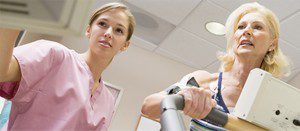Florida Heart Associates –


First things first, it is important to learn what a cardiac stress test really is, and why the result would ever be helpful to you. A stress test, sometimes called a treadmill test or exercise test, helps a doctor find out how well your heart is working. A cardiac stress test is helpful because as your body continues to work harder and harder during the test, the heart has to pump more blood and so your doctor is going to be able to see whether or not your body is able to keep up with the pace. If not, then chances are that your heart is just not in good enough condition and so your doctor is going to want to do something about it to strengthen it. As your body works harder during the test, it requires more oxygen, so the heart must pump more blood. The test can show if the blood supply is reduced in the arteries that supply the heart. It also helps doctors know the kind and level of exercise appropriate for a patient.
In a patient with chest pain of unknown cause, a stress test is used to make a diagnosis of coronary artery disease (blockages in the coronaries, the vessels that supply the heart muscle with blood).
In a patient with known coronary artery disease or a prior heart attack, a stress test is used to predict future heart attacks or risk of death.
Keep in mind that there are several things you may be asked during this, and which you should not be surprised about. You are going to be walking on a treadmill and they may even ask you to breathe into a tube for a few minutes, but this is not always necessary, so you shouldn’t be surprised either way.
During the test your heart rate, breathing and blood pressure are all going to be monitored, and you are going to know the results once it is completed.
It will tell if there are any areas of the heart muscle that suffer from low blood supply secondary to blockages in the coronary arteries. Although it can’t show the blockages in the coronary arteries (only a more invasive test such as a cardiac catheterization can do this), it can determine the effect of these blockages by showing abnormalities on the electrocardiogram (on a plain exercise test) or by showing the areas that suffer from low blood supply (on a stress test with imaging).
Depending on the results of the exercise stress test, the physician may recommend more tests. If anything does need to be done once you have completed the stress test, your doctor is going to be able to talk with you and make sure that you are together going to find the right treatment and get your body in the best shape, just as it should be, and then will probably perform another stress test a few months down the road to note any improvement.
If you experience chest discomfort that occurs with exertion and is relieved by rest, particularly if you have other risk factors for coronary artery disease (such as diabetes, high cholesterol levels, hypertension or family history of heart attacks at a young age), you should be evaluated with a stress test. If you have had a previous heart attack, you should have a stress test to help prevent s second, possibly fatal attack. Please call Florida Hear Associates at 239-938-2000 today to learn more about the preventative benefits of a stress test, and other ways to keep your heart healthy and strong.
Elizabeth M. Cosmai-Cintron, MD, FACC, FACP
Elizabeth M. Cosmai-Cintron, MD, FACC, was born in Brooklyn, New York. She moved to Kissimmee, Florida at the age of 3, for which she still has family that reside in Central Florida.
She received her Bachelor of Science degree from Emory University in Atlanta, GA in 1994. She was awarded her medical doctorate degree from the University of Florida-Shands Hospital, Gainesville, FL in 1999.
Read more: www.flaheart.com
 Southwest Florida's Health and Wellness Magazine Health and Wellness Articles
Southwest Florida's Health and Wellness Magazine Health and Wellness Articles

